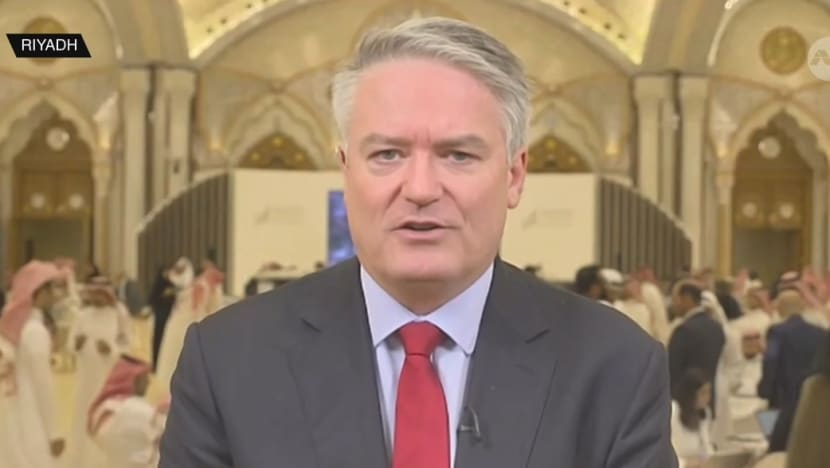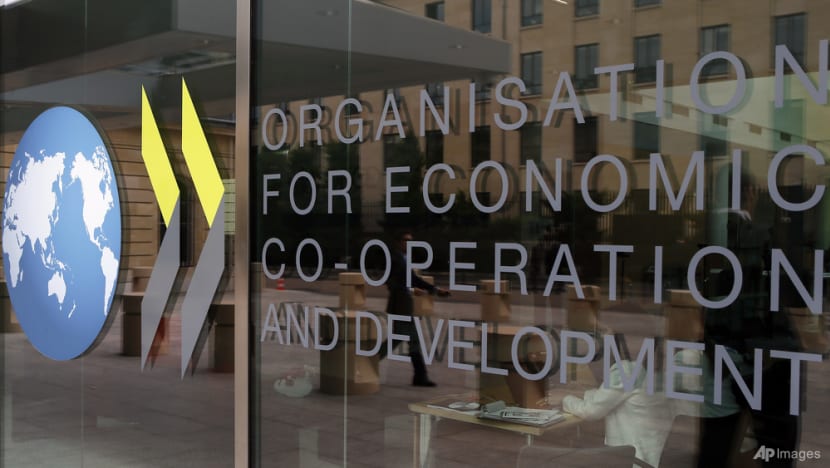Asia’s economic outlook ‘relatively strong’ despite subdued global growth: OECD chief
Asia will benefit from China’s reopening despite a muted global growth forecast and amid troubles brewing in the banking sector, Mr Cormann said.

Organisation for Economic Cooperation and Development’s (OECD) Secretary-General Mathias Cormann speaks to CNA on the sidelines of the Financial Sector Conference in Riyadh, Saudi Arabia.
SINGAPORE: Asia’s economic outlook for the year is expected to be “relatively strong”, as the region benefits from China’s reopening, despite a muted global growth forecast and amid troubles brewing in the banking sector, OECD chief Mathias Cormann said on Thursday (Mar 16).
“Our outlook for Asia is relatively strong growth and strong recovery, subject to a level of downside risks,” said the secretary-general of the Organisation for Economic Cooperation and Development’s (OECD).
“The Chinese economy reopening will lead to stronger growth in China, which will have a positive effect across Asia as a whole.”
He spoke to CNA’s Asia Tonight on the sidelines of the Financial Sector Conference in Riyadh, Saudi Arabia.
While the global economic outlook remains more subdued compared to before Russia's invasion of Ukraine, Mr Cormann said growth is expected to continue.
“The world continues to pay a heavy price for (the war), in terms of the economic and social impacts,” he said.
“But having said that, we do expect that the global economy will continue to grow. Our outlook today is slightly brighter.”
The Paris-based policy forum’s latest analysis of major global economic trends and prospects, which will be released on Friday, will be more positive compared to its previous assessment in November last year, said Mr Cormann.
This is in spite of growing worries over recent bank failures and scandals in the United States and Europe.
SVB A ‘VERY SIGNIFICANT FAILURE’
The recent collapse of three US banks and fresh turmoil in embattled Swiss lender Credit Suisse have once again put financial regulation under intense scrutiny.
Wild swings in the markets rattled by investor jitters revived fears of a contagion that could lead to a global banking crisis.
While Mr Cormann described the high-profile demise of the Silicon Valley Bank (SVB) as a “very significant failure”, he said the OECD has assessed that global banking systems, as well as that of the US, are well capitalised.
As such, the mayhem surrounding SVB, Signature Bank, Silvergate Bank and Credit Suisse is not expected to lead to any broader systemic issues, he said.
However, Mr Cormann said this now raises a series of questions for regulators to answer: in particular, whether the banks should have been treated as systemically important for the purposes of regulatory supervision.
“This is a level of financial turbulence that increases the level of risk in the US and global economy,” he said. “We certainly need to make sure we learn the lessons very swiftly of what and why this happened.”
TACKLING INFLATION
Mr Cormann also addressed higher prices around the world during the wide-ranging interview.
Inflation in the OECD economies has steadily increased since the start of 2021, driven by soaring energy and food prices.
Policymakers have pivoted towards tighter policies and central banks across emerging markets and advanced economies have hiked interest rates to rein in soaring prices.
Related:
Mr Cormann said the “very assertive actions” taken by central banks so far have been “appropriate”, adding that policymakers need to continue to make tough decisions in order to get inflation under control.
“Impacts of (tightening) monetary policy (will include) slightly lower growth, lower demand. But we do believe that we will see an easing of inflationary pressures over time,” he said.
“Already, energy and food prices are significantly lower than their peak, post Russia’s invasion of Ukraine.”
Aside from capping inflation, authorities need to pursue structural reforms, green energy transitions, and the digital transformations of the economy, he said.
“There are a lot of downside risks in the global economy. The economic outlook is fragile. There are lots of challenges in front of us but we have got to continue to work through those issues.”
AVOIDING DEBT CRISIS
One such issue is a potential debt crisis, with the International Monetary Fund (IMF) stating that about 15 per cent of low-income countries are in debt distress, while another 45 per cent of the population are at high risk.

Mr Cormann said that “positive international cooperation” is required to avoid a global debt crisis, with advanced economies taking the lead.
“Low income countries, in particular, are under huge pressure, given the levels of debt and what's happening to interest rates. The international community, predominantly via the G20, needs to continue to work on effective international solutions to help provide the necessary support,” he said.
Mr Cormann said that in an increasingly divided world, the OECD seeks to facilitate inclusive international dialogue and provide platforms to find solutions.
“One of the big reform agendas that we have pursued in recent times is the reform of international tax arrangements to help ensure that governments around the world can raise the appropriate levels of revenue … which is a very important component tool for fiscal resilience, fiscal sustainability, and the capacity to address those debt challenges,” he said.















